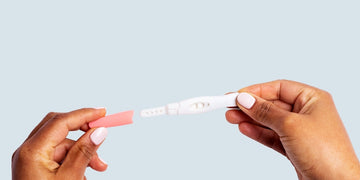How soon can you take a pregnancy test after sex?

Whether you’re trying to get pregnant or not, the urge to take a pregnancy test immediately after having sex is common. So, when should you take a pregnancy test, how do pregnancy tests work, and what can affect the efficacy of the test?
How soon can you take a pregnancy test after sex?
If you are taking an at-home pregnancy test, it may be best to wait until the day following the day your next period should begin. Although some tests may be sensitive enough to detect hCG earlier, the hormone’s presence in your urine will increase with time, making an accurate result more likely. Blood pregnancy tests can detect pregnancy earlier than urine tests because they are more sensitive, but they are also more expensive.
How soon after sex can you get pregnant?
The first day of a missed period marks the beginning of pregnancy, but fetal development doesn’t begin until after conception. Conception usually occurs two weeks after the first day of your last period (around the time of ovulation). The implantation process may happen several days after you have sex. At this point, hormones needed to support and maintain a pregnancy are released.
When can pregnancy be detected?
It takes some time for hCG to build up enough for a pregnancy test to detect it. When you miss a period (and your menstrual cycle is regular), it might be time to take a pregnancy test. Tracking ovulation can also help you determine whether a pregnancy test might be necessary. If you track ovulation, you can take a pregnancy test around 14 days after the last time you ovulated. Missing a period is the most obvious signal that you might be pregnant. Other signs suggesting you might be pregnant and should take a pregnancy test include:- Bloating
- Nausea or vomiting
- Sore or full breasts
- The need to pee frequently
- Feeling fatigued
How do pregnancy tests work?
Pregnancy tests detect the presence of the hormone human chorionic gonadotropin (hCG). When a fertilized egg attaches to the lining of the uterus (the implantation process), hCG is released. Blood tests and urine tests can both detect the presence of hCG. You can do a urine pregnancy test at home or in a clinic. Urine tests have more accurate results about 14 days following conception. Blood tests can only be done at a medical office and provide more accurate results about 10 days after conception.
There are two different types of blood pregnancy tests: qualitative and quantitative. Qualitative blood tests will tell you whether hCG is present in your blood. Quantitative blood tests will measure how much of the hormone is present.
Shop the article
What’s the best time of the day to take a pregnancy test?
Once your menstrual period is late, you can take a pregnancy test. Before this, it may be too early in the pregnancy to detect hCG levels. Take a home pregnancy test first thing in the morning because hCG levels will be most concentrated and easily detectable. HCG levels can become diluted when you drink water, and it may affect the accuracy of the test.
How long does a blood pregnancy test take?
You'll have to go to a medical office for a blood pregnancy test. Your primary care provider will take a sample of your blood and send it to a lab for analysis. It can take anywhere from a few hours to over a day to get your results from the lab. A quantitative blood test can compare levels of hCG through the pregnancy, but it is typically used only for higher-risk pregnancies or multiples.
What can cause false-negative or false-positive test results?
Sometimes pregnancy test results will be false negative (indicating you’re not pregnant when you are) or false positive (reads as if you’re pregnant, but you’re not). You may get inaccurate results from a pregnancy test for various reasons, including:
- You test too soon, and there isn’t enough hCG to be detected
- You used a test that isn’t sensitive enough to detect lower levels of hCG
- You don’t use the test immediately after opening it
- The pregnancy test is expired
- You drank too much water, diluting your urine
- You tested later in the day. You use certain infertility medications
If you take a pregnancy test too early, it might cause a false negative result. There’s a “two-week rule” that those with a regular 28-day cycle may follow. However, this guideline isn’t reliable for many since several factors may make things less predictable. Your usual menstrual cycle can be affected by factors such as:
- Stress
- Birth control
- Antidepressants
- Painkillers like aspirin or ibuprofen
- Certain medical conditions, including thyroid disorders
Keep Reading

When do I take a pregnancy test during my cycle?
Feb 17

When is the best time to take a pregnancy test?
Nov 23

Can a pregnancy test be wrong?
Aug 31










